Are you suffering from hyperthyroidism or do you suspect you have hyperthyroidism?
If so you need to understand ALL of the treatments available to you as a patient.
This guide will walk you through the most common hyperthyroid treatments including conventional medications and procedures, the potential side effects, and also natural approaches to managing your thyroid.
Let’s jump in:
Hyperthyroidism Explained in Plain English
Hyperthyroidism is a medical condition that results in the excessive release of thyroid hormone from the thyroid gland.
This release of thyroid hormone, at very high levels, causes all sorts of physiologic problems in your body such as overactivation of your heart, increased release of adrenaline, and increased turnover of bone mass.
If left alone for long periods of time you may start to develop osteoporosis, an enlarged heart, fatigue, hair loss, weight loss, and so on.
Because of these negative side effects, it’s very important to identify and treat hyperthyroidism if it is present as soon as possible!
But what causes hyperthyroidism?
The most common cause of hyperthyroidism is from an autoimmune disease known as Graves’ disease (1).
Graves’ disease is a condition, caused when your immune system goes haywire, in which you create antibodies (2) that ultimately attack and stimulate the release of thyroid hormone from your thyroid gland.
Patients with Graves’ disease may have antibodies known as Thyroid Stimulating Immunoglobulins in circulation which can be assessed by standard lab tests.
Other conditions, such as toxic multinodular goiter, may also cause hyperthyroidism but these other conditions are not as common as Graves’ disease.
So how do you treat hyperthyroidism?
The answer is actually quite simple:
You block or prevent your thyroid gland from releasing thyroid hormone into the blood-stream.
This is sometimes easier said than done, however, because the medications and procedures we have to reduce thyroid hormone may actually swing you from hyperthyroidism into hypothyroidism (you can learn more about this here).
But how do we do this?
Conventional Treatments for Hyperthyroidism
There are a couple of different ways to go about blocking thyroid hormone release.
The first is to take medication that acts on the thyroid gland itself and prevents the release of thyroid hormone.
If you take these medications then you are naturally blocking thyroid release and there will be less thyroid hormone in your blood and your symptoms should stop.
This approach usually isn’t a long-term solution, however, because long-term use of anti-thyroid medications is associated with some negative side effects.
Another approach to treating hyperthyroidism is to simply destroy or completely remove the thyroid gland (3).
If you destroy the thyroid gland then it can’t produce thyroid hormone and if you remove the gland then obviously it can’t produce thyroid hormone either.
The problem with these approaches is that they may create a scenario in which you are treating the main problem (hyperthyroidism) but you might be causing further problems down the line.
It turns out that we do in fact need our thyroid gland for the production of thyroid hormone!
These complications have to do with the fact that once you damage or remove your thyroid gland you, as the patient, are now reliant upon thyroid medication for the rest of your life.
So, after your procedure, you’ve switched from having too much thyroid hormone to potentially having too little (which is associated with other side effects).
Even though this scenario may not be ideal, it may actually be necessary, especially for most people.
But because both hyperthyroidism and hypothyroidism can cause issues, it’s worth exploring alternative or natural therapies as well as conventional ones.
#1. Anti-Thyroid Medication (Beta Blockers, Methimazole & PTU)
Medications are often the first-line therapy to treat and manage hyperthyroidism among patients.
The reason is that medications can often be taken very quickly and tend to slow down thyroid effects on target tissues very rapidly.
The medications that are often used to treat hyperthyroidism fall into two main groups:
The first includes medications that BLOCK the effect of thyroid hormone on peripheral tissues.
Medications in this category include Beta Blockers such as Propranolol.
It also may help to block the effects of adrenaline which can reduce hand tremors and reduce anxiety.
This medication, however, does NOT treat the underlying problem.
It’s helpful to reduce symptoms, but it does NOT reduce thyroid hormone production.
This is where the second group of medication comes in:
These other medications help BLOCK thyroid hormone production and thyroid conversion.
Medications that fit into this category include Methimazole (Tapazole) and PTU.
These medications actually act to treat hyperthyroidism (as opposed to simply blocking the symptoms associated with the disease).
These medications tend to help swing the patient from the side of hyperthyroidism over to hypothyroidism if the dosing is too high.
It can be difficult to manage these medications because it’s hard to assess whether or not you are “balancing” thyroid function properly.
These are all signs that the dose of the medication may be too much.
Medications are often the first line of therapy for hyperthyroid patients, but they usually are not used long-term (partly because of the side effects we just discussed).
Some studies have shown that Methimazole may be preferable to long-lasting procedures such as radioactive iodine ablation, but other studies show that they are equal in terms of long-term side effects (6).
#2. Surgical Removal of the Thyroid Gland (Partial or Complete Thyroidectomy)
Another common and more long-term solution to treating hyperthyroidism is the surgical procedure known as a complete thyroidectomy.
A thyroidectomy refers to the surgical and complete removal of the thyroid gland.
The idea behind this procedure is that if you are unable to manage the secretion of thyroid hormone with medications (listed above) then the next best approach may be to simply take the thyroid gland out.
Taking the thyroid gland out is not a free ride, however, and does come with certain consequences.
Among those consequences is that the person who has their thyroid removed will have to take supplemental thyroid hormone medication for the rest of their life.
Thyroid hormone is a hormone that is necessary for life.
Meaning, if you don’t have enough you can go into a coma and potentially die.
Taking out the thyroid gland may be necessary for some situations, but it is worth considering all your options before you choose this.
Patients who take out their thyroid gland may have difficulty with dosing thyroid hormone after their procedure and may gain up to 15 pounds after the procedure.
Undergoing hyperthyroid treatment increases the risk of the patient of developing obesity by 32% (7), which shouldn’t be ignored when considering your options.
If you go into your thyroidectomy with a normal weight or normal BMI then you are much more likely to not suffer from weight gain after the procedure, but those who go into the procedure overweight will likely gain more weight.
#3. Radioactive Iodine Ablation (Destruction of the Thyroid Gland)
Radioactive iodine ablation is another therapy that can be used to treat hyperthyroidism.
This procedure uses radioactive iodine which enters the thyroid gland and locally destroys the thyroid gland tissue.
In most cases, the goal of this therapy is to completely destroy the glandular tissue.
Like patients who undergo a thyroidectomy, those who undergo radioactive iodine ablation may be reliant upon thyroid medication for the rest of their life after the procedure.
This isn’t always true, however, because sometimes the damage is “incomplete”.
Sometimes the procedure may result in only 50% damage to the gland or 70% damage and so on.
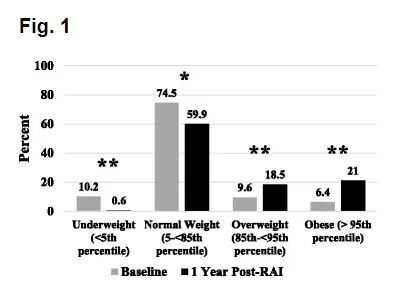
In terms of weight gain after the procedure, some studies show that patients who undergo radioactive iodine ablation are likely to gain weight and become overweight (about double the risk of normal patients) and MUCH more likely to become obese (8) (more than triple the risk of normal patients) based on BMI.
Sometimes the procedure is necessary, but these side effects should always be discussed prior to the procedure.
Natural Treatments for Hyperthyroidism
Are there natural treatments for hyperthyroidism?
Yes, but it turns out that these therapies may not be effective for all patients and they may not necessarily be ideal for certain patients.
The natural approach to hyperthyroid management usually includes changing diet, the use of certain supplements, and even the use of medications.
But the main question is this:
Is it safe to use natural therapies to treat hyperthyroidism?
And this is where we need to be careful.
It’s safe to try natural therapies for ailments provided those ailments will not cause long-term harm if you avoid natural and conventional treatment in the meantime.
We don’t want to ever use the natural approach if there is a risk of long-term harm to the patient.
The issue with hyperthyroidism is that avoiding conventional therapies may be harmful to the body because excessive thyroid hormone production is known to cause cardiovascular issues (heart problems), osteoporosis, and other negative side effects.
So how are you supposed to approach natural therapies?
The best approach may be to use combined therapies.

Meaning you can combine the use of hyperthyroid conventional therapies (medications and so on) in conjunction with these natural therapies.
No one, at least not in their right mind, would argue that eating healthy, if combined with conventional therapies, will probably cause more harm than good to the patient.
But, it might be harmful to you to try and change your diet all while ignoring the fact that you have very high circulating thyroid hormone in your bloodstream as you avoid conventional therapies.
This philosophy changes once you undergo radioactive iodine ablation and/or a complete thyroidectomy because now you are no longer hyperthyroid you have now entered the realm of hypothyroidism (you can read more about this concept here).
So with these concepts in mind let’s discuss some of the natural therapies to treat hyperthyroidism.
#1. Dietary Intervention
Dietary intervention is probably the safest and potentially most effective way to naturally treat hyperthyroidism.
This is particularly true if you suffer from Graves’ disease.
Graves’ disease, the most common cause of hyperthyroidism, is an autoimmune disease which means that every patient with this condition suffers from an imbalance in their immune system.
There have been scientific studies that link the development of autoimmune disease to gut dysfunction (increased intestinal permeability) and even food intolerance such as Celiac disease (9).
It may, therefore, be a great idea to try and alter your diet if you have hyperthyroidism!

So how do you go about doing this?
The best approach is to avoid certain foods and food groups while including certain healthy anti-inflammatory-based foods.
We also know that the consumption of these foods is somehow linked to the increased rates seen in autoimmune diseases.
We can use this idea as a starting point to determine how to proceed with the diet.
Foods to avoid if you have hyperthyroidism:
- Gluten
- Refined carbohydrates (bread, pasta, cereals, etc.)
- Refined sugar
- Heavily processed foods
- Fast foods
- Inflammatory fats or industrial seed oils
- Alcohol
- Foods heavy in preservatives
There are many diets you can follow which utilize these guidelines and the exact diet you follow is not as important as simply removing these food groups.
Foods to consume if you have hyperthyroidism:
- Healthy fats, oils, and nuts (cold-pressed oils)
- Organic fruits and vegetables (daily consumption of both)
- Healthy sources of proteins such as wild-caught fish or pastured chicken/pork
- Plant sources of protein such as buckwheat, hemp seeds, chia seeds, nutritional yeast, and seeds
- Filtered water
While this isn’t a complete list of foods to consume it should give you a general starting point.
You can learn more about which foods to eat and avoid if you have hyperthyroidism in this post.
#2. Iodine Supplementation
Another therapy that may potentially help treat hyperthyroidism is the use of high doses of iodine (the supplement).
Iodine is a necessary component of thyroid hormone and a certain amount is required for the normal production of thyroid hormone.
Newer studies have found links between high and low iodine status in the individual and the development of autoimmune diseases.
The exact mechanism as to why this occurs is not well understood but there does appear to be a connection.
In this section, we are not talking about low doses (the average recommended dose is around 150mcg per day), but instead large doses of up to 12.5mg per day.
Iodine, if taken in sufficiently high doses, has a thyroid-blocking effect that can be used to temporarily shut down the production of thyroid hormone.
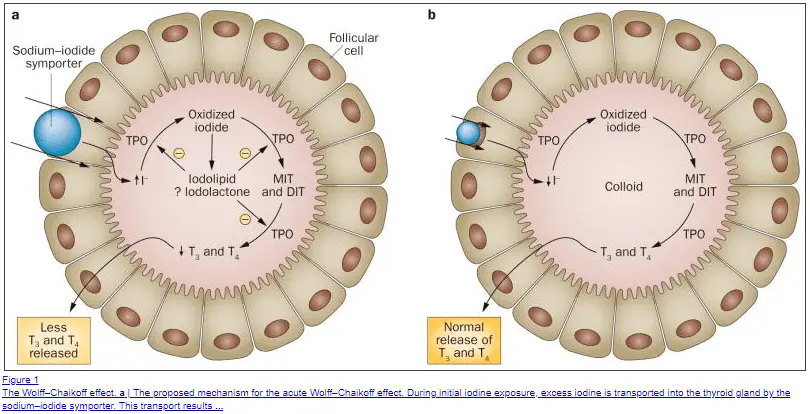
Using this known mechanism may be a way to temporarily treat hyperthyroidism by blocking thyroid hormone production.
It’s not necessarily a long-term solution, but it may be effective for the treatment of a flare-up or to help start other therapies.
Because iodine may temporarily block thyroid function you should not use this therapy without consulting your current physician.
In addition, in order for this to be effective, you will likely need to use doses much higher than the standard and recommended daily intake of 150mcg per day.
You can read more about iodine supplementation here.
#3. Low Dose Naltrexone
LDN is a prescription medication that may be helpful in treating some autoimmune diseases for certain people.
LDN stands for low-dose naltrexone which is an opioid antagonist.
LDN was originally created and used to treat alcohol dependence (13) but recently has been shown to have weight-lowering benefits (and is now in the medication Contrave (14)) and may also be beneficial in reducing inflammation.
This medication is also used off-label to treat some autoimmune conditions such as Hashimoto’s thyroiditis and inflammatory bowel disease (15).
Off-label means that the medication hasn’t been specifically proven to work for these conditions but some practitioners and patients have found success in using it.
LDN would be considered “off-label” for the treatment of hyperthyroidism but it may be worth considering in the case of Graves’ disease.
Some studies indicate that the use of LDN may help to reduce inflammation which may in turn help to reduce autoantibody production and may, therefore, treat hyperthyroidism.
Like other alternative therapies, your mileage may vary, but as a relatively inexpensive medication with very few side effects it may be worth considering.
LDN also has the benefit of potentially helping with weight loss and helping to reduce insulin resistance which often tends to accompany hyperthyroidism (post-treatment).
You can learn more about LDN here.
#4. Supplements
Supplements can also be used to potentially help treat hyperthyroidism.
We’ve already discussed Iodine (which is available over the counter) but there are other supplements as well.
If you have hyperthyroidism stick to supplements that tend to support thyroid function such as zinc and selenium (16).
Supplements that help reduce inflammation such as fish oil, Turmeric/Curcumin, and alpha lipoic acid.
And supplements that may help boost the immune system such as vitamin D3, zinc, and glutathione.
Whenever possible you should attempt to target the use of supplements to specific deficiencies in your body.
Supplementation for the sake of supplementation is not a great therapy by itself (though many supplements CAN be helpful if used correctly).
Final Thoughts
Hyperthyroidism is a potentially serious medical attention that can be treated with a combination of both natural and conventional approaches.
Medical and conventional intervention may be necessary to help reduce symptoms and prevent dangerously high levels of circulating thyroid hormone.
Natural treatments and therapies can often be added or “layered” on top of conventional therapies for even better results.
The use of both therapies may be sufficient to help prevent or reverse the cause of hyperthyroidism in your body.
When it comes to alternative and conventional treatments for hyperthyroidism make sure that you use them only if they won’t cause more harm than good.
But now I want to hear from you:
Are you currently being treated for hyperthyroidism?
Which therapies have you undergone?
Have they worked for you?
Have you used natural therapies with success?
Why or why not?
Leave your comments below!
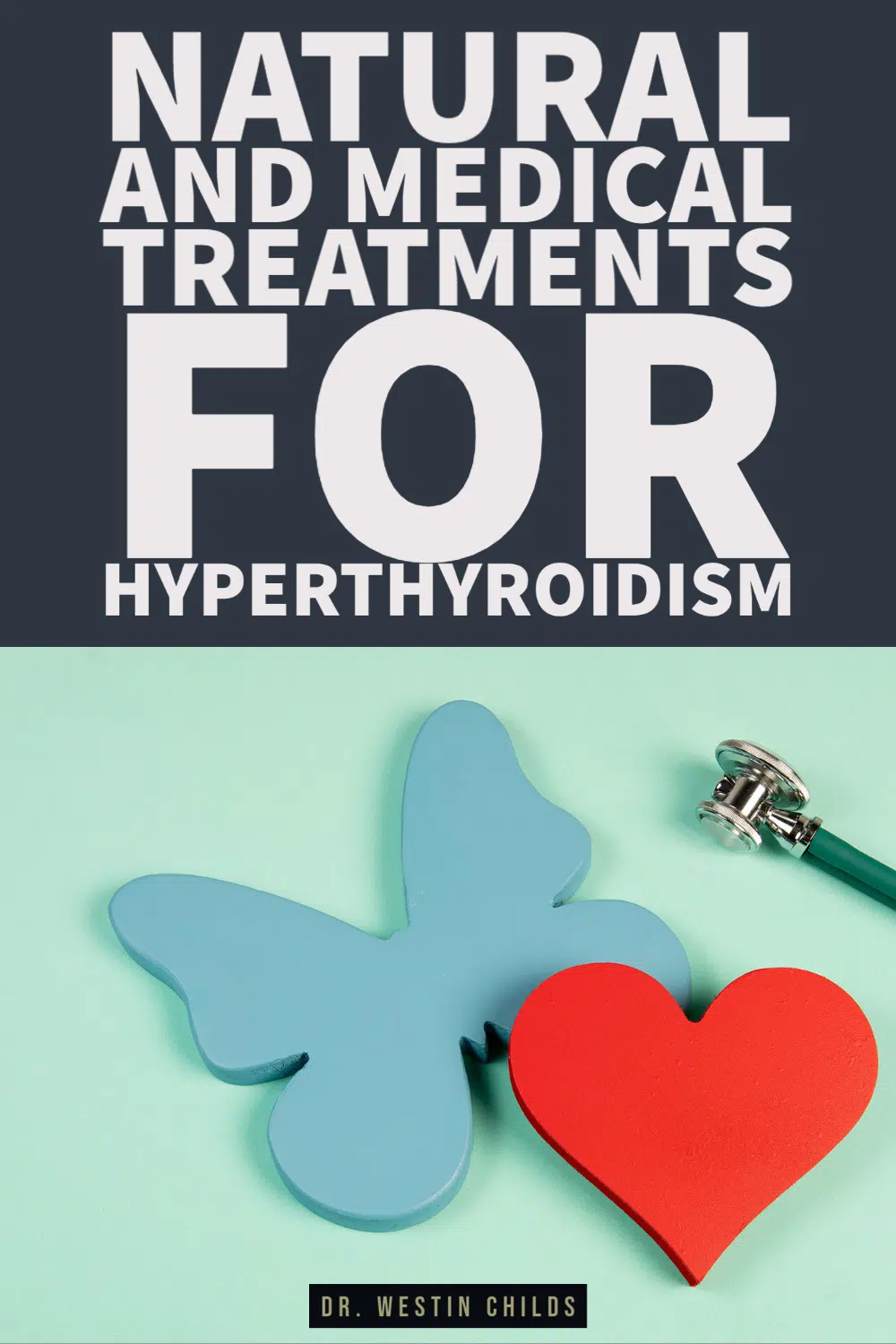
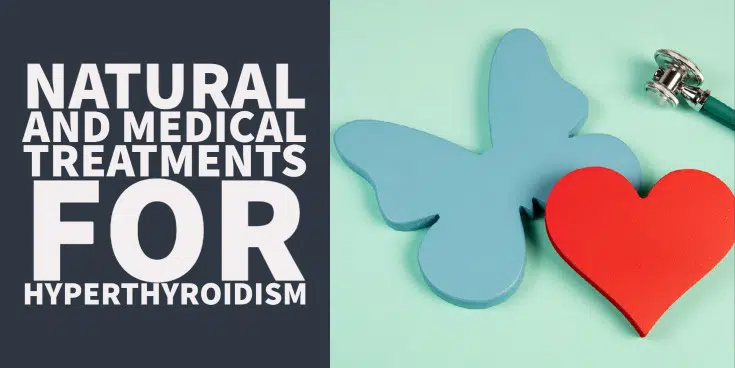
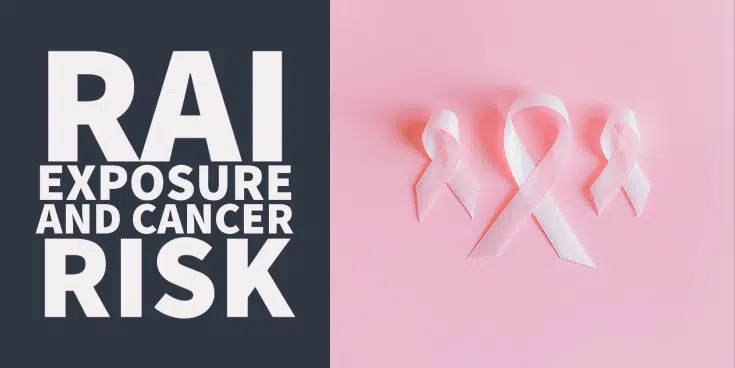
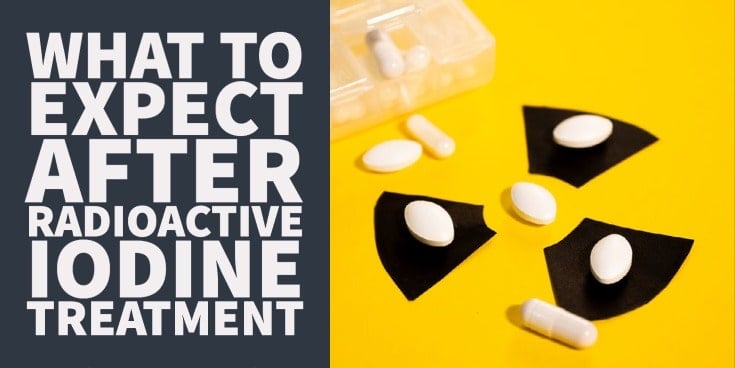
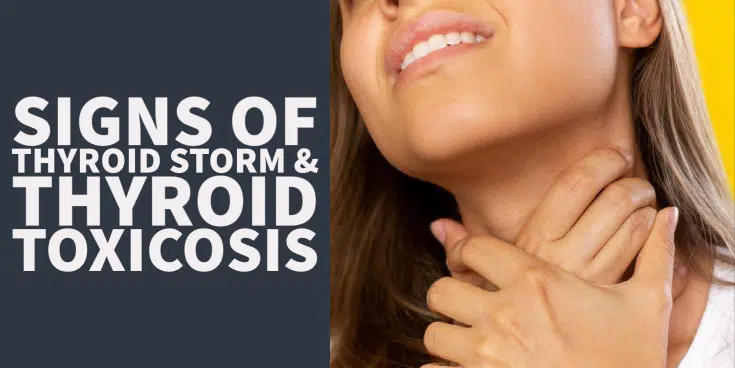
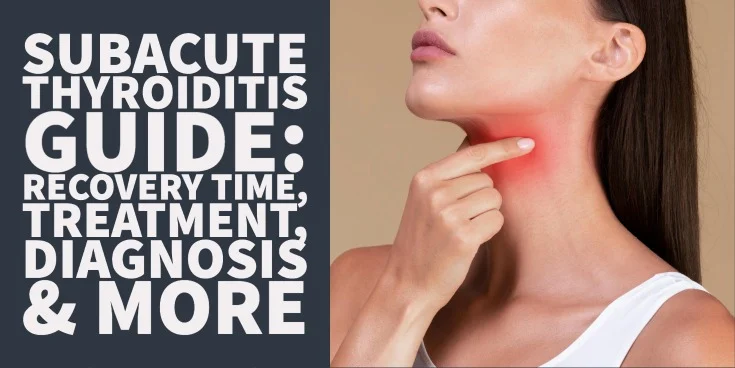
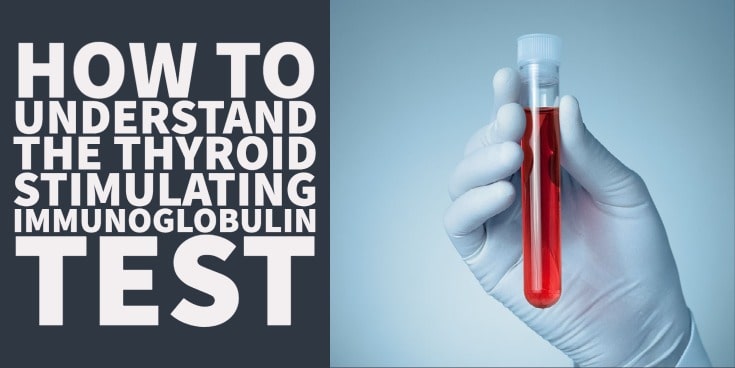
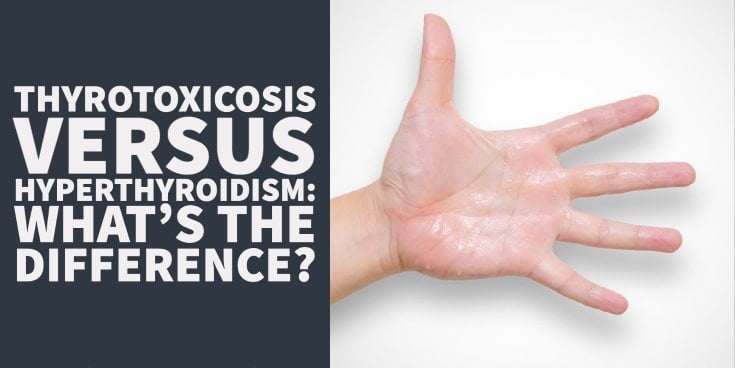

Thank you for the details of the diet for Graves’ Disease and Hyperthyroidism. I was diagnosed of Hyperthyroidism in Oct 2017, then subsequently confirmed Thyroid Eye Disease in Jan 2018. I have just started the IV steroid for and will soon add ocular radiation and immunosuppressant, methotrexate. All these heavy medication and invasive treatment are used to manage my inflammed eye muscles, the root cause of the autoimmune dysfunction is still not yet addressed. I’m glad to learn a lot about diet from your blog but need to find a functional medicine doctor in my area. I will at least review my diet to begin with.
Hi Sharron,
It would definitely be best to find a local physician to help you, but in the meantime you can also learn more about managing your diet here: https://www.restartmed.com/graves-disease-diet/
Keep us updated on your progress!
Hi,
I had my thyroid surgically removed at NIH back in 2001. I was only 41 at the time and had a mutlinodular goiter that had grown large enough to warrant surgery.
At that time I was experiencing extreme anxiety -even though my thyroid was large, all my thyroid tests were normal. An endocronologist had attempted to reduce the goiter through a suppression technique where he prescribe extra synthroid. Not only did that NOT work in reducing the goiter, it made me hyperthyroid and I also developed osteopenia.
After I had my thyroid removed, I just didn’t feel like myself and mentioned this to the NIH endocronologist. I remember him saying, “There is so much about the thyroid that we just don’t know about.”
For awhile, I was actively working to try and improve my health by trying different supplements. But this was all on my own. I have yet to find a doctor experienced in treating and helping thyroidectoemy patients. Especially women who had a thyroidectomy at a young age.
To combat my depression, I have been taking 20mg Prozac daily. When I don’t take it, I get almost suicidal, when I do take it, I am 25 lbs overweight.
I was finding some relief from taking Armor Thyroid – taking three 30 mcg pills daily was working great for awhile. But that prescription has become extremely expensive, and does not work as well as it used to. (I have since found out that the formulation changed a few years ago)
Now, I’m 58 and feel a bit hopeless as to what my options are. The dosage of thyroid medicine that keeps my brain healthy is bad for my bones. Despite a healthy diet and supplementation with Calcium and Vit D, my blood tests show that I am low in both.
Thanks for all your information. I am going to try your suggestions and hope they will improve my condition! Thanks
Hi Crystal,
You may be able to improve thyroid conversion through some of the techniques listed here: https://www.restartmed.com/increase-free-t3-naturally/
That way you can improve thyroid function without the risk of osteoporosis.
Hi Dr. Westin,
Thank you so much for this post. Can you please help me understand if I have hyperthyroidism or hypothyroidism? My TSH is 0.14, T4 free is 1.7, T3 free is 3.6, and T3 reverse is 18. My thyroglobulin antibodies are 198 (in 2012, they were over 7,000, and thyroid peroxidase is 1. I’ve been told that I have Hashimoto’s disease and I’m not on any thyroid medication.
Thank you for your answer.
Hi Lily,
Hashimoto’s is a disease that usually ends up causing hypothyroidism over time. Initially, after diagnosis, patients with Hashimoto’s may go through periods of hyperthyroidism and hypothyroidism.
You can read more about how that happens here: https://www.restartmed.com/hashimotos-symptoms/
Hi Dr. Westin,
Thank you so much for this informative article. I find this topic very confusing. I was diagnosed with Hashimoto’s in 2012 when my thyroglobulin antibodies were as high as the lab would measure (over 7,000). Since then, I changed my diet radically (eliminated gluten and recently diary, eggs and at some point also nightshades), and managed to bring my antibodies to less than 200. A couple of months ago, I started taking 4,5mg LDN, and I’m yet to see if there are any changes.
I have a sizable goiter, and I’m confused if I should be taking iodine or not. Additionally, I’m taking Vit D3, Selenium, Zinc, complex Vit B (have both genes for MHTFR), fulvic acid, Folic Acid 800mcg, B6 and B12 shots. However, I’m consistently dealing with digestive issues and can’t seem to heal my leaky gut (I’m taking digestive enzymes and Betain but not consistently). Stool test didn’t uncover anything significant, and I’m yet to take a SIBO test.
I’m very confused if I have hyperthyroidism or hypothyroidism, and what can I do to improve my health?
My TSH is 0.14; T4 FREE 1.7; T3 FREE 3.6; T3 REVERSE 18.
Thank you for your feedback,
Lily
Hi Dr Westin,
Thank you for your informative post and maintaining this website. I had goiter and hyperthyroidism when I was 16, treated with propylthiouracil. It worked but left me cold with horribly brittle hair, for life. Over the years I slowly became borderline underactive, not surprising since my mother has Hashimoto’s. I’m now 41. Thyroid ultrasounds over the years always show some remnants of the goiters, but are always deemed normal after discussion among ultrasound specialists. When I checked last year, I had both highly elevated antibodies for hypo/hyperthyroidism but my TSH, T3/T4 are always within norms. 4 months ago I became a vegetarian and started eating seaweed and eggs regularly. I kept my dose to under 100 per day from seaweed but forgot to include iodine from 3 eggs/day that I was also eating, in my calculations. I also binged on some seaweed snacks a few times over the last few weeks (guessing 500/day, 3 times over 2 weeks). Now, I got that familiar anxiety I had when I had a goiter as a young adult, I’ve lost so much weight over the last month I look like a stick, and eat everything in site, and I definitely have Thyroid eye disease which worries me most – I did not get before at 16. My eyelids keep raising on me, and it’s difficult to control my eye movements. This started last week. I also have Sjogren’s which doesn’t help. Is it Wolff-Chaikoff effect from my iodine binge for a couple of weeks, following a dose of almost 200 per day for 4 months? (100 from seaweed, 75 from eggs) and a seaweed snack binge (3x 500)? I have been living in Thailand for the last year, next to the sea, but have always avoided standard iodized salt. It will be very hard to communicate with a doctor about it when I see one next week, so any advice will be greatly appreciated.
Beta Blockers do also block T4 to T3 conversion.
Hi Jennifer,
Yes, they do. They also block thyroid action in certain cells in your body such as the heart.
I was diagnosed with hypothyroidism. I am not going to take these toxic drugs and destroy my life. I’ll give a chance to the natural treatments and supplements. Why risk it? The doctor gave me beta blockers I am taking it and that’s all I will take. I took and appointment with a nutritionist. I am testing tomorrow by D3 level. Isn’t it enough and safer?
Hi Fatiha,
I think your confusing thyroid medication with other drugs. Thyroid medication is a bio-identical hormone so it’s not in the same category as other prescription drugs such as beta blockers. Those medications are man-made whereas thyroid hormone is a replica of the same hormone your own body produces when it’s healthy.
Natural therapies are great, but there are plenty of people who will find that natural therapies are insufficient and may ultimately need to be on medication for a variety of reasons.
Sorry, I wrote hypothyroidism I meant hyperthyroidism. I am still struggling and still taking beta-blockers for the symptoms. I tried the gluten-free diet it didn’t work for me I had stomach problems and low energy. I’m taking the supplements you mentioned. I am very sensitive to medications. I will take the probiotics. Then if I don’t improve I’ll go to a Homeopath. My goiter is shrinking is it a good sign? Thank you so much.
Hi Dr
Another question. Which probiotic shall I take and what is the potency?
Thank you so much.
Hi Fatiha,
You can find more information about probiotics and dosing here: https://www.restartmed.com/best-probiotic/
Hi there, I was wondering if you could help my 1 year old son. His TSH tested a 4.61 but his T4 tested in the upper range and his Free T3 tested above normal levels at 7.9. Max range here is 6.9. Any ideas why his T3 is so high, it has been increasing for the past few months? Should he be taking thyroid meds even though it seems he has some hyper symptoms. I just don’t understand why his TSH is above the optimal range when his thyroid hormones are so high.
Hi again
Isn’t NeoMercazole 5 carbimazole a medicine?
I bought it and never touched it.
Thank you so much again for your kindness.
Hi Fatiha,
Yes, it is a prescription medication.
Thank you for this great website; it confirms something that I’ve been suspecting for YEARS….methimazole IS causing a lot of my weight gain. I’ve never been heavy and now have 20-30 lbs that I cannot, CANNOT seem to lose. When I mentioned that to my endocrinologist, he suggested that I take metformin to help with insulin resistance. Needless to say, I’m trying to avoid that at all costs. My question is, how can I find a doctor who is willing to try new and updated techniques for treating Graves’ Disease? I’ve been battling with this since 2011 and am so frustrated. I feel fine, stay very active and am the most dedicated to health and fitness, but still, struggle with this weight. I understand very well that Graves/Hyperthyroidism is nothing to be fiddled with or underestimated, but weight gain is just as serious with the danger of the effects of weight gain and the discouraging factor. How do I find someone who can help? Is there a directory somewhere that you can recommend? Thank you in advance.
Hello, I was diagnosed with hyperthyroidism over a year ago. I am on methimazole 10mg once daily. I have no outward s/s of hypterthyroidism. I have gained weight in the last year and this is so annoying. I initially lost 50 pounds and looked great when this all started. so here is my question:
for weight loss, can I take one of the supplements advertised(to block the fat and for fast weight loss)? methimazole is the only medication that I take, I have no other issues. I see my endocrinologist every 6 months.
thanks in advance.
Hi Pam,
Taking methimazole is like putting the brakes on your metabolism. It will be very difficult to lose weight while you are taking it.